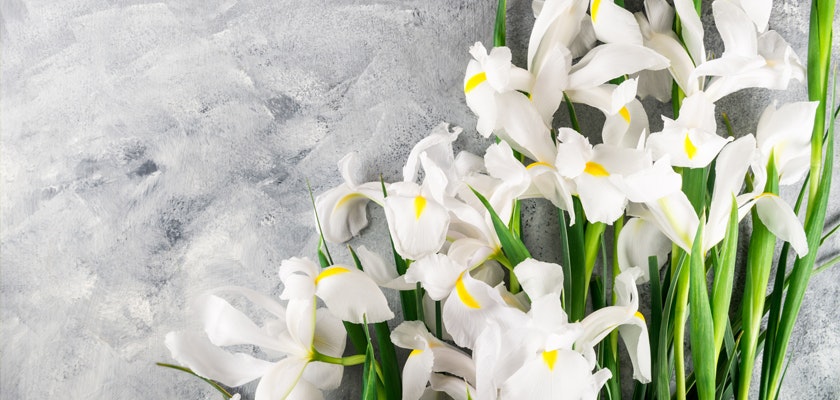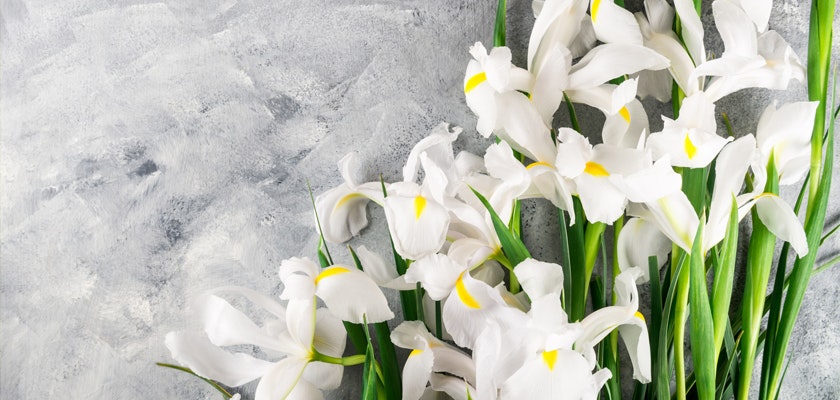The Iris Unveiled: A Journey through Its Meanings and Symbolism
Flowers, with their diverse hues and fragrances, have a unique way of speaking to our hearts. Among these, the iris stands out as a flower rich in symbolism and historical significance.
Dive into the captivating world of irises, exploring their rich symbolism, cultural significance, and unique color meanings
The iris is not just a beautiful bloom to admire; it carries a profound narrative woven through various cultures and eras.
The name 'Iris' translates as 'rainbow' in Greek, reflecting the flower's variety of colors. Each hue communicates a different sentiment, making the iris a versatile medium for expressing emotions. Whether it's faith symbolized by blue irises or passion represented by yellow ones, the iris can convey messages that words often struggle to express.
Dive into the captivating world of irises, exploring their rich symbolism, cultural significance, and unique color meanings
The iris is not just a beautiful bloom to admire; it carries a profound narrative woven through various cultures and eras.
The name 'Iris' translates as 'rainbow' in Greek, reflecting the flower's variety of colors. Each hue communicates a different sentiment, making the iris a versatile medium for expressing emotions. Whether it's faith symbolized by blue irises or passion represented by yellow ones, the iris can convey messages that words often struggle to express.
In this comprehensive guide, we delve into the world of irises, exploring their meanings, symbolism, and the stories they tell. We'll journey from Ancient Greece to Victorian England, discovering how different cultures interpret this beautiful flower. We'll also look at the fascinating implications of the iris's various colors and the significance of its name.
Whether you're a botanist, a florist, or someone who simply appreciates the beauty and symbolism of flowers, this guide will provide you with intriguing insights into the world of irises. So, let's embark on this floral journey and uncover the captivating story of the iris.
The Meaning of Iris
The iris, with its striking appearance and rich color palette, holds a prominent place in the world of flowers. Its name, derived from the Greek word for 'rainbow', reflects its wide range of colors. But the iris is more than just a beautiful bloom; it's a bearer of messages and a symbol of deep sentiments.
In floriography, the language of flowers, the iris carries meanings of faith, courage, hope, and wisdom. These associations can be traced back to Greek mythology, where Iris was the goddess of the rainbow and a messenger for Zeus and Hera. Her role as a divine courier gave the iris its symbolic association with communication and messages.
The iris is also associated with valor and chivalry, likely due to its regal appearance and its link to the Greek gods. In some cultures, it symbolizes positive change, reflecting the transformative power of its divine namesake. The iris's complex symbolism represents a blend of the flower's historical, mythological, and visual attributes.
In addition to these general meanings, each color of the iris conveys a unique message. From the passionate yellow iris to the sincere blue one, the flower's hues add another layer to its extensive symbolism. By understanding these color-specific meanings, we can use the iris more effectively to convey our sentiments.
Iris Meanings: Faith and Hope
One of the key meanings associated with the iris is that of faith and hope. This association can be traced back to ancient times when the flower was seen as a symbol of divine protection and guidance. It was believed that the goddess Iris used rainbows to travel between heaven and earth, carrying messages from the gods to humans.
This divine connection gave the iris a sacred status, making it a symbol of faith and hope. It came to represent trust in the divine and the hope for better things to come. Even today, the iris often features in religious art, symbolizing the heavenly messages carried by the goddess Iris.
In the language of flowers, the blue iris is particularly associated with faith and hope. Its serene color mirrors the calmness of the sky and the sea, evoking feelings of trust and optimism. Whether gifted in a bouquet or planted in a garden, blue irises serve as a beautiful reminder to keep faith and hope alive.
Iris Meanings: Wisdom
Another profound meaning attached to the iris is wisdom. This association likely stems from the flower's link to the Greek goddess Iris, who was known for her wisdom and insight. As a divine messenger, Iris was privy to the knowledge of the gods, making her a symbol of wisdom and guidance.
The iris flower, with its intricate structure and bold colors, reflects this wisdom in its own unique way. It embodies the beauty that comes with knowledge and the vibrancy that wisdom can bring to life. In this sense, the iris serves as a floral reminder of the value of wisdom and the richness it adds to our lives.
Purple irises, in particular, are associated with wisdom. The color purple has long been linked to royalty and wisdom, and when combined with the iris's symbolic associations, it creates a powerful emblem of knowledge and insight. A bouquet of purple irises can be a thoughtful gift for someone embarking on a new journey or facing a significant decision, symbolizing the wisdom needed for the path ahead.
In this comprehensive guide, we delve into the world of irises, exploring their meanings, symbolism, and the stories they tell. We'll journey from Ancient Greece to Victorian England, discovering how different cultures interpret this beautiful flower. We'll also look at the fascinating implications of the iris's various colors and the significance of its name.
Whether you're a botanist, a florist, or someone who simply appreciates the beauty and symbolism of flowers, this guide will provide you with intriguing insights into the world of irises. So, let's embark on this floral journey and uncover the captivating story of the iris.
The Meaning of Iris
The iris, with its striking appearance and rich color palette, holds a prominent place in the world of flowers. Its name, derived from the Greek word for 'rainbow', reflects its wide range of colors. But the iris is more than just a beautiful bloom; it's a bearer of messages and a symbol of deep sentiments.
In floriography, the language of flowers, the iris carries meanings of faith, courage, hope, and wisdom. These associations can be traced back to Greek mythology, where Iris was the goddess of the rainbow and a messenger for Zeus and Hera. Her role as a divine courier gave the iris its symbolic association with communication and messages.
The iris is also associated with valor and chivalry, likely due to its regal appearance and its link to the Greek gods. In some cultures, it symbolizes positive change, reflecting the transformative power of its divine namesake. The iris's complex symbolism represents a blend of the flower's historical, mythological, and visual attributes.
In addition to these general meanings, each color of the iris conveys a unique message. From the passionate yellow iris to the sincere blue one, the flower's hues add another layer to its extensive symbolism. By understanding these color-specific meanings, we can use the iris more effectively to convey our sentiments.
Iris Meanings: Faith and Hope
One of the key meanings associated with the iris is that of faith and hope. This association can be traced back to ancient times when the flower was seen as a symbol of divine protection and guidance. It was believed that the goddess Iris used rainbows to travel between heaven and earth, carrying messages from the gods to humans.
This divine connection gave the iris a sacred status, making it a symbol of faith and hope. It came to represent trust in the divine and the hope for better things to come. Even today, the iris often features in religious art, symbolizing the heavenly messages carried by the goddess Iris.
In the language of flowers, the blue iris is particularly associated with faith and hope. Its serene color mirrors the calmness of the sky and the sea, evoking feelings of trust and optimism. Whether gifted in a bouquet or planted in a garden, blue irises serve as a beautiful reminder to keep faith and hope alive.
Iris Meanings: Wisdom
Another profound meaning attached to the iris is wisdom. This association likely stems from the flower's link to the Greek goddess Iris, who was known for her wisdom and insight. As a divine messenger, Iris was privy to the knowledge of the gods, making her a symbol of wisdom and guidance.
The iris flower, with its intricate structure and bold colors, reflects this wisdom in its own unique way. It embodies the beauty that comes with knowledge and the vibrancy that wisdom can bring to life. In this sense, the iris serves as a floral reminder of the value of wisdom and the richness it adds to our lives.
Purple irises, in particular, are associated with wisdom. The color purple has long been linked to royalty and wisdom, and when combined with the iris's symbolic associations, it creates a powerful emblem of knowledge and insight. A bouquet of purple irises can be a thoughtful gift for someone embarking on a new journey or facing a significant decision, symbolizing the wisdom needed for the path ahead.
Iris Meanings: Positive Change
The iris also symbolizes positive change. This meaning is rooted in the transformative journey of the goddess Iris, who traversed between the realms of heaven and earth. Her ability to bridge these worlds signifies transition and change, attributes that are reflected in the iris flower.
The blooming of an iris, with its vibrant colors and intricate patterns, mirrors the beauty of positive change. It serves as a reminder that change, though sometimes challenging, can lead to growth and new possibilities. The iris encourages us to embrace change, assuring us of the beauty that lies on the other side.
Yellow irises, with their bright and cheerful hue, are often associated with positive change. They embody the warmth and positivity that change can bring, making them a perfect gift for anyone undergoing a significant transition. A bouquet of yellow irises can convey a message of support and optimism, encouraging the recipient to embrace the changes in their life.
Iris Symbolism Around the World
Ancient Greece: In Ancient Greece, the iris was associated with the goddess Iris, who was known as the messenger of the gods and the personification of the rainbow. The Greeks believed that the goddess used rainbows to travel between heaven and earth, and they saw the iris flower as a symbol of her divine messages. This connection made the iris a sacred flower in Ancient Greek culture, embodying divine communication, guidance, and protection.
China: In Chinese culture, the iris is a revered flower, often associated with the promise of good news and the arrival of summer. The Chinese name for iris translates to 'purple butterfly', evoking images of transformation and grace. The iris's vibrant colors and elegant form have made it a popular motif in Chinese art and poetry, symbolizing the beauty and ephemeral nature of life.
Japan: In Japan, the iris carries a host of symbolic meanings. It's often associated with purity, innocence, and the warrior spirit. The iris is a common feature in Boys' Day celebrations in Japan, where it symbolizes the hope for healthy growth and development in young boys. The flower's sword-like leaves are believed to ward off evil spirits, making the iris a powerful emblem of protection and bravery.
Victorian England: During the Victorian era, the language of flowers, or floriography, was at its peak, and the iris held significant meaning. Victorians associated the iris with good news, valuing it as a symbol of communication and messages. The flower's intricate design and vibrant colors also made it a symbol of imagination and eloquence in Victorian floriography.
France: The iris, particularly the fleur-de-lis design, holds a special place in French symbolism. The fleur-de-lis, which means 'lily flower' but is stylized as an iris, has been a symbol of French royalty since the Middle Ages. It represents perfection, light, and life. Today, the fleur-de-lis is a cultural symbol of France, reflecting the nation's history and identity.
Egypt: In ancient Egypt, the iris was seen as a symbol of resurrection and eternal life. This association comes from the flower's three upright petals, which were believed to symbolize the journey of the soul after death. The iris's vibrant colors and regal appearance made it a fitting symbol for the ancient Egyptians' beliefs about the afterlife.
Iris Meanings By Flower Color
Purple Irises: Purple irises carry a message of wisdom and admiration. Their royal hue echoes sentiments of respect and high regard, making them a perfect gift for someone you deeply admire. They can also symbolize wisdom, making them a thoughtful present for someone facing a significant decision or transition.
White Irises: White irises symbolize purity and innocence. Their pristine color makes them a popular choice for weddings, embodying the purity of love and the promise of a fresh start. White irises can also convey messages of hope and faith, making them a comforting presence in times of sorrow or loss.
Yellow Irises: Yellow irises are associated with passion and positive change. Their bright color brings a sense of warmth and cheerfulness, embodying the optimism that accompanies positive change. A bouquet of yellow irises can be a beautiful way to celebrate new beginnings or express passionate feelings.
Blue Irises: Blue irises symbolize faith and hope. Their serene color mirrors the tranquility of the sky and the sea, evoking feelings of trust and optimism. Whether given as a gift or planted in a garden, blue irises serve as a beautiful reminder of the enduring nature of faith and the uplifting power of hope.
What Does the Name Iris Mean?
The name 'Iris' carries a rich tapestry of meanings and associations. Derived from the Greek word for 'rainbow', it reflects the flower's variety of colors. This connection to the rainbow links the name Iris to concepts of hope, promise, and transformation.
In Greek mythology, Iris was the goddess of the rainbow and a messenger of the gods. This association imbues the name with connotations of divine messages, communication, and guidance. The name Iris symbolizes a bridge between heaven and earth, mirroring the role of its mythological namesake.
The name Iris also carries a sense of grace and elegance, reflecting the flower's beauty. It's a name that speaks of wisdom, faith, and hope, embodying the profound symbolism of the iris flower.
Art and Irises
Irises have been a popular subject in art for centuries due to their striking appearance and symbolic depth. Artists ranging from classic painters to modern photographers have been captivated by the iris's beauty, using it as a muse in their works.
In the world of painting, one of the most famous depictions of irises is Vincent Van Gogh's 'Irises'. This masterpiece captures the vibrant colors and intricate patterns of the flower, reflecting Van Gogh's fascination with nature's beauty. The iris's symbolism of hope and positive change resonates with the artist's personal struggles, adding an emotional layer to the painting.
Irises have also found their place in the realm of photography. Their unique structure and diverse color palette make them a fascinating subject for close-up shots. Photographers often use irises to experiment with lighting and focus, showcasing the flower's beauty in new and innovative ways.
In literature, irises often feature as symbols of change, communication, and divine messages. They're used to convey deep emotions and complex themes, reflecting the flower's rich symbolism. From ancient Greek epics to contemporary poetry, the iris continues to inspire writers with its narrative potential.
Even in the world of fashion, irises have made their mark. Their vibrant colors and elegant form have inspired numerous clothing designs and accessories. Whether printed on a silk scarf or embroidered on a dress, irises bring a touch of nature's beauty to the fashion world.
Iris Meanings: Positive Change
The iris also symbolizes positive change. This meaning is rooted in the transformative journey of the goddess Iris, who traversed between the realms of heaven and earth. Her ability to bridge these worlds signifies transition and change, attributes that are reflected in the iris flower.
The blooming of an iris, with its vibrant colors and intricate patterns, mirrors the beauty of positive change. It serves as a reminder that change, though sometimes challenging, can lead to growth and new possibilities. The iris encourages us to embrace change, assuring us of the beauty that lies on the other side.
Yellow irises, with their bright and cheerful hue, are often associated with positive change. They embody the warmth and positivity that change can bring, making them a perfect gift for anyone undergoing a significant transition. A bouquet of yellow irises can convey a message of support and optimism, encouraging the recipient to embrace the changes in their life.
Iris Symbolism Around the World
Ancient Greece: In Ancient Greece, the iris was associated with the goddess Iris, who was known as the messenger of the gods and the personification of the rainbow. The Greeks believed that the goddess used rainbows to travel between heaven and earth, and they saw the iris flower as a symbol of her divine messages. This connection made the iris a sacred flower in Ancient Greek culture, embodying divine communication, guidance, and protection.
China: In Chinese culture, the iris is a revered flower, often associated with the promise of good news and the arrival of summer. The Chinese name for iris translates to 'purple butterfly', evoking images of transformation and grace. The iris's vibrant colors and elegant form have made it a popular motif in Chinese art and poetry, symbolizing the beauty and ephemeral nature of life.
Japan: In Japan, the iris carries a host of symbolic meanings. It's often associated with purity, innocence, and the warrior spirit. The iris is a common feature in Boys' Day celebrations in Japan, where it symbolizes the hope for healthy growth and development in young boys. The flower's sword-like leaves are believed to ward off evil spirits, making the iris a powerful emblem of protection and bravery.
Victorian England: During the Victorian era, the language of flowers, or floriography, was at its peak, and the iris held significant meaning. Victorians associated the iris with good news, valuing it as a symbol of communication and messages. The flower's intricate design and vibrant colors also made it a symbol of imagination and eloquence in Victorian floriography.
France: The iris, particularly the fleur-de-lis design, holds a special place in French symbolism. The fleur-de-lis, which means 'lily flower' but is stylized as an iris, has been a symbol of French royalty since the Middle Ages. It represents perfection, light, and life. Today, the fleur-de-lis is a cultural symbol of France, reflecting the nation's history and identity.
Egypt: In ancient Egypt, the iris was seen as a symbol of resurrection and eternal life. This association comes from the flower's three upright petals, which were believed to symbolize the journey of the soul after death. The iris's vibrant colors and regal appearance made it a fitting symbol for the ancient Egyptians' beliefs about the afterlife.
Iris Meanings By Flower Color
Purple Irises: Purple irises carry a message of wisdom and admiration. Their royal hue echoes sentiments of respect and high regard, making them a perfect gift for someone you deeply admire. They can also symbolize wisdom, making them a thoughtful present for someone facing a significant decision or transition.
White Irises: White irises symbolize purity and innocence. Their pristine color makes them a popular choice for weddings, embodying the purity of love and the promise of a fresh start. White irises can also convey messages of hope and faith, making them a comforting presence in times of sorrow or loss.
Yellow Irises: Yellow irises are associated with passion and positive change. Their bright color brings a sense of warmth and cheerfulness, embodying the optimism that accompanies positive change. A bouquet of yellow irises can be a beautiful way to celebrate new beginnings or express passionate feelings.
Blue Irises: Blue irises symbolize faith and hope. Their serene color mirrors the tranquility of the sky and the sea, evoking feelings of trust and optimism. Whether given as a gift or planted in a garden, blue irises serve as a beautiful reminder of the enduring nature of faith and the uplifting power of hope.
What Does the Name Iris Mean?
The name 'Iris' carries a rich tapestry of meanings and associations. Derived from the Greek word for 'rainbow', it reflects the flower's variety of colors. This connection to the rainbow links the name Iris to concepts of hope, promise, and transformation.
In Greek mythology, Iris was the goddess of the rainbow and a messenger of the gods. This association imbues the name with connotations of divine messages, communication, and guidance. The name Iris symbolizes a bridge between heaven and earth, mirroring the role of its mythological namesake.
The name Iris also carries a sense of grace and elegance, reflecting the flower's beauty. It's a name that speaks of wisdom, faith, and hope, embodying the profound symbolism of the iris flower.
Art and Irises
Irises have been a popular subject in art for centuries due to their striking appearance and symbolic depth. Artists ranging from classic painters to modern photographers have been captivated by the iris's beauty, using it as a muse in their works.
In the world of painting, one of the most famous depictions of irises is Vincent Van Gogh's 'Irises'. This masterpiece captures the vibrant colors and intricate patterns of the flower, reflecting Van Gogh's fascination with nature's beauty. The iris's symbolism of hope and positive change resonates with the artist's personal struggles, adding an emotional layer to the painting.
Irises have also found their place in the realm of photography. Their unique structure and diverse color palette make them a fascinating subject for close-up shots. Photographers often use irises to experiment with lighting and focus, showcasing the flower's beauty in new and innovative ways.
In literature, irises often feature as symbols of change, communication, and divine messages. They're used to convey deep emotions and complex themes, reflecting the flower's rich symbolism. From ancient Greek epics to contemporary poetry, the iris continues to inspire writers with its narrative potential.
Even in the world of fashion, irises have made their mark. Their vibrant colors and elegant form have inspired numerous clothing designs and accessories. Whether printed on a silk scarf or embroidered on a dress, irises bring a touch of nature's beauty to the fashion world.
Types of Irises
Bearded Iris: Known for their fuzzy 'beards', bearded irises are a popular choice among gardeners. These flowers come in a wide range of colors and have a sweet fragrance. Their dramatic appearance and easy care make them a favorite among flower enthusiasts.
Siberian Iris: Siberian irises are known for their slender, grass-like leaves and delicate flowers. Their elegant form and hardy nature make them an excellent choice for landscaping. These flowers bloom in late spring to early summer, adding a touch of color to the garden.
Japanese Iris: Japanese irises are revered for their large, flat flowers and vibrant colors. These flowers have been cultivated in Japan for centuries and are often featured in traditional art and celebrations. They require slightly acidic soil and plenty of water, making them a bit challenging to grow but rewarding with their stunning blooms.
Dutch Iris: Dutch irises are popular cut flowers, known for their striking colors and long vase life. These flowers typically bloom in late spring and come in a variety of colors, including blue, yellow, and white. Their tall, sturdy stems make them an excellent choice for bouquets and floral arrangements.
Louisiana Iris: Native to the southern United States, Louisiana irises thrive in wet conditions. These flowers come in a range of colors, from classic blues and purples to unique shades of brown and red. Their love for water makes them a great choice for water gardens or areas with poor drainage.
BloomsyBox's Bouquets and the Iris Flower
BloomsyBox, a leading home delivered flowers, offers beautiful bouquets featuring the iris flower. These hand-tied arrangements are carefully crafted to showcase the iris's beauty and symbolism. Whether you want to express faith, hope, wisdom, or positive change, BloomsyBox has an iris bouquet that's perfect for you.
With their commitment to quality and sustainability, BloomsyBox sources their flowers from Rainforest Alliance Certified farms. This ensures that your iris bouquet is not only beautiful but also environmentally friendly. Each bouquet is delivered fresh to your doorstep, ensuring that the irises retain their vibrant colors and delicate fragrance.
Ordering an iris bouquet from BloomsyBox is more than just purchasing flowers; it's about sending a message. Whether you're celebrating a new beginning, expressing admiration, or simply brightening someone's day, an iris bouquet can convey your sentiments beautifully.
Types of Irises
Bearded Iris: Known for their fuzzy 'beards', bearded irises are a popular choice among gardeners. These flowers come in a wide range of colors and have a sweet fragrance. Their dramatic appearance and easy care make them a favorite among flower enthusiasts.
Siberian Iris: Siberian irises are known for their slender, grass-like leaves and delicate flowers. Their elegant form and hardy nature make them an excellent choice for landscaping. These flowers bloom in late spring to early summer, adding a touch of color to the garden.
Japanese Iris: Japanese irises are revered for their large, flat flowers and vibrant colors. These flowers have been cultivated in Japan for centuries and are often featured in traditional art and celebrations. They require slightly acidic soil and plenty of water, making them a bit challenging to grow but rewarding with their stunning blooms.
Dutch Iris: Dutch irises are popular cut flowers, known for their striking colors and long vase life. These flowers typically bloom in late spring and come in a variety of colors, including blue, yellow, and white. Their tall, sturdy stems make them an excellent choice for bouquets and floral arrangements.
Louisiana Iris: Native to the southern United States, Louisiana irises thrive in wet conditions. These flowers come in a range of colors, from classic blues and purples to unique shades of brown and red. Their love for water makes them a great choice for water gardens or areas with poor drainage.
BloomsyBox's Bouquets and the Iris Flower
BloomsyBox, a leading home delivered flowers, offers beautiful bouquets featuring the iris flower. These hand-tied arrangements are carefully crafted to showcase the iris's beauty and symbolism. Whether you want to express faith, hope, wisdom, or positive change, BloomsyBox has an iris bouquet that's perfect for you.
With their commitment to quality and sustainability, BloomsyBox sources their flowers from Rainforest Alliance Certified farms. This ensures that your iris bouquet is not only beautiful but also environmentally friendly. Each bouquet is delivered fresh to your doorstep, ensuring that the irises retain their vibrant colors and delicate fragrance.
Ordering an iris bouquet from BloomsyBox is more than just purchasing flowers; it's about sending a message. Whether you're celebrating a new beginning, expressing admiration, or simply brightening someone's day, an iris bouquet can convey your sentiments beautifully.
The iris flower, with its rich symbolism and diverse colors, holds a special place in our hearts and cultures. From ancient myths to modern art, the iris continues to inspire and fascinate us with its beauty and depth.
Whether you're gifting an iris bouquet or planting these flowers in your garden, understanding their meanings can add another layer of appreciation for these beautiful blooms. The next time you see an iris, take a moment to admire its beauty and reflect on the profound messages it carries.
As we bid adieu to our exploration of the iris, we leave you with a final thought: Flowers, like the iris, are not just a feast for the eyes; they're a language that speaks directly to the heart. So, let's keep this language alive, one bloom at a time.
The iris flower, with its rich symbolism and diverse colors, holds a special place in our hearts and cultures. From ancient myths to modern art, the iris continues to inspire and fascinate us with its beauty and depth.
Whether you're gifting an iris bouquet or planting these flowers in your garden, understanding their meanings can add another layer of appreciation for these beautiful blooms. The next time you see an iris, take a moment to admire its beauty and reflect on the profound messages it carries.
As we bid adieu to our exploration of the iris, we leave you with a final thought: Flowers, like the iris, are not just a feast for the eyes; they're a language that speaks directly to the heart. So, let's keep this language alive, one bloom at a time.




